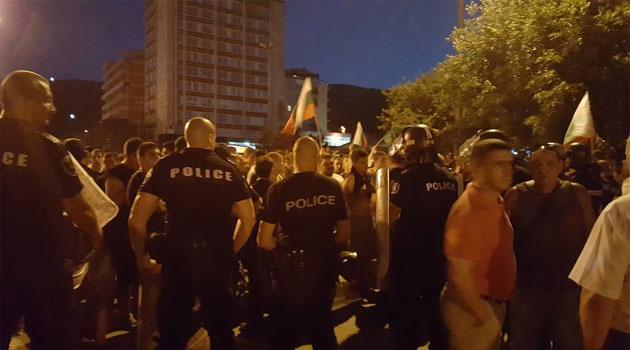Bulgaria: Scandal over EU-financed training to detect alleged "radicalization" of Roma, activists say money was used to boost anti-Romani sentiment

A group called the Citizens for Democracy and the Rule of Law Coalition is protesting against the use of EUR 1.7 million from the European Social Fund (ESF) to train police officers to detect the alleged “radicalization” of Romani people in Bulgaria. In an open letter to the European Commission, the Coalition says the project is leading to the stigmatization of the entire Romani community as one that is allegedly radicalized and that it contravenes EU legal regulations.
The four-year project is being implemented by the Bulgarian Interior Ministry. According to information provided to news server Romea.cz, both Bulgarian and EU bodies have already begun investigating the use of the financing in response to the open letter.
Those who signed the open letter are asking the European Commission to investigate whether such use of money from the ESF by the Bulgarian authorities for activities aimed at identifying and preventing alleged “radicalization” in the Romani community constitutes a violation of the principles of non-discimination, promotion of equal opportunities, necessity, proportionality and legality. “We are also requesting you investigate how it was possible that the managing authority of the “Good Governance” Operational Program in Bulgaria was allocated funding for such activities,” the open letter reads.
According to information in the Bulgarian media, which is also confirmed by information on the Bulgarian Interior Ministry’s website, 480 police officers from all over Bulgaria attended a training on the “Early identification of signs of radicalization with focus on Roma community (Psychological and ethno-confessional aspects of the processes of radicalization among Roma communities).” The training was held from 22-24 July this year.
According to the open letter, the project description featured the following activities:
“… to be prepared a special teaching methodology on the topic of radicalization which in the future will contribute to the training of the officers of the Ministry of Interior, working in the field with communities under the influence of the radicalization phenomenon. Here the emphasis will be mainly on the Roma population and the processes of radicalization within the closed Roma communities… Participants in trainings for trainers on the early identification of signs of radicalization with focus on Roma community include 22 employees of the Institute of Psychology at Ministry of Interior. Twenty trainings of Security Police officers are to be conducted. 24 participants per group, 2 lecturers from the Institute of Psychology – Ministry of Interior and 1 external expert… Organization of a closing scientific conference in Sofia on the topic of radicalization with focus on Roma community for 150 people.”
Moreover, according to the Coalition, the project description provides no justified reasons as to why the Romani community in Bulgaria might have an alleged tendency to radicalization and it is not clear, therefore, why the activities were implemented in the first place. “In light of the above, we consider it necessary to state that the project entitled “Expansion of the Expert Capacity of the Ministry of Interior for Prevention of Aggressive Events in Society, Corruption and Radicalization” leads to stigmatization of [the] Roma community in Bulgaria as a radicalized ethnic community, contrary to … European and … Bulgarian legislation,” the letter states.
“Thus, instead of combating anti-Gypsyism in Bulgaria, the Bulgarian government contributes to the reinforcement of the anti-Roma sentiments in the country by creating even more dangerous ethnic stereotypes, implying that Roma people pose a threat to the national security of Bulgaria,” the Coalition concludes. In their view, the financial resources of EU taxpayers have apparently been spent on project activities that directly contravene the EU’s fundamental legal regulations.
Those who signed the letter are demanding an answer from the European Commission to the following questions:
1) Who are the authors of the above-mentioned project and why was this project funded by the “Good Governance” Operational Program in Bulgaria and the European Social Fund?
2) Why did the managing authority of the “Good Governance” Operational Program and the Monitoring Committee to this program approve the funding of the above described activities with money from ESF?
3) In what way were the trainings on Roma “radicalization” justified in front of the managing authority of the program in Bulgaria?
4) What is the definition [of] “radicalization” in this project?
5) Was this project communicated with the Secretariat of the National Council on Ethnic and Integration Issues to the Council of Ministers which serves as a National Contact Point for the implementation of Bulgarian National Strategy for Roma Integration (2012-2020)?
6) What training materials and methodologies have been prepared and used for the trainings under this project?
7) What were the criteria for selection of participants in the trainings?
8) Who were the trainers and what kinds of trainings did they provide to the participants?
9) What payments have [the] contractors received, and do these payments correspond to the work done and to payments for similar types of job[s] in Bulgaria?
10) What was the mechanism for monitoring and evaluating the project? And what are the concrete results from this project in terms of preventing corruption and radicalization in Bulgarian society?
In conclusion, the Coalition expresses the hope that the concerns expressed in the open letter will be taken on board by the European Commission as it designs the EU’s future inclusion strategy on Roma post-2020 and during the design of the new Operational Programmes for the 2021-2027 financial period so as to prevent the risk of EU financing being invested into beefing up institutional and structural racsim against Romani people in some Member States. The letter is signed by more than 30 people including lawyers, municipal officials, political scientists and Romani activists.
